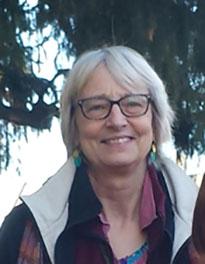Dr. Annette Nassuth

I was introduced to some intriguing metabolic pathways as an undergraduate student at the Free University in Amsterdam. To better understand the biochemical and molecular aspects of metabolism, I completed an MSc degree at the Free University. I used this training to investigate the interaction between plants and viruses, first as a PhD student at the University of Leiden, then as a Post-Doctoral Fellow at the Max Planck Institute for Biochemistry in Munich. My knowledge of plant metabolism increased while I was a Research Associate at the University of Ottawa. I have since continued this work at the University of Guelph. Although my group has researched virus – plant interactions, the current emphasis is on abiotic stress tolerance.
I am a member of a number of scientific societies, including the Canadian Society of Plant Biologists, the American Association for Plant Biologists and the International Society for Horticultural Science. I have served for many years as the Virology Section editor for the Canadian Journal of Plant Pathology. I still serve as a referee for various scientific journals and for granting agencies.
- BSc, MSc -Free University, Amsterdam
- PhD - University of Leiden
- Post-Doctoral Fellow, Max Planck Institute for Biochemistry in Munich
- Senior Research Associate, Department of Biochemistry, University of Ottawa
My research group investigates biotic and abiotic stress on plants at the cellular and sub-cellular biochemical and molecular levels. The objective is to identify what changes occur in plant cells upon exposure to stress and which of these changes aid the plant to increase its tolerance to the stress.
A major focus currently is the investigation of freezing stress tolerance in grapevines. Winters in Ontario can cause substantial damage to the cultivated grapes used in the Wine Industry, whereas wild grapes have no problems. We try to find out what the molecular basis is for this phenomenon. In particular, what genes switch "on" or "off" and thereby regulate a large number of other genes? What is different between these genes in the freezing tolerant wild Vitis riparia and the freezing sensitive wine grape Vitis vinifera or other members of the Vitaceae family? Potentially interesting genes are analyzed by a variety of techniques, including bioinformatic analyses, RT-PCR to detect the type of transcripts and conditions under which they accumulate, and mutant plants. We have developed a quantitative transient transactivation assay which we use to analyze the regulating transcription factors we have identified. The ultimate goal is to use this knowledge to improve freezing and drought stress tolerance in the cultivated grapes.
Research Papers
- Nassuth, A., Siddiqua, M., Xiao, H., Moody, M.A. and C. E. Carlow. 2014. Newly developed quantitative transactivation system shows difference in activation by Vitis CBF transcription factors on DRE/CRT elements. Plant Methods 10: 32. doi:10.1186/1746-4811-10-32.
- Nassuth, A., Martinez, T., Crapper, L., Jetha, Z., Siddiqua, M., Zandstra, J. and H. Fisher: 2014. The development of techniques and molecular markers for interspecific breeding of grape for freezing tolerance. Acta Horticulturae 1046: 395-402.
- Rahman, M.A., Moody, M.A., and A. Nassuth. 2014. Grape contains 4 ICE genes whose expression includes alternative polyadenylation, leading to transcripts encoding at least 7 different ICE proteins. Env. Exp. Bot. 106: 70-78.
- Wisniewski, M., Nassuth, A., Teulières, C., Marque, C., Rowland, J., Cao, P.B., and Brown, A. 2014. Genomics of cold hardiness in woody plants. Critical Reviews in Plant Science 33:92-124.
- Siddiqua, M. and A. Nassuth. 2011. Vitis CBF1 and Vitis CBF4 differ in their effect on Arabidopsis abiotic stress tolerance, development and gene expression. Plant, Cell Environment 34: 1345–1359. (doi: 10.1111/j.1365-3040.2011.02334.x)
- Siddiqua, M., Xiao, H. and A. Nassuth. 2009. Promoter analysis of grape CBF genes. Acta Horticulturae 827: 323-328.
- Xiao, H., Tattersall, E.A.R., Siddiqua, M.K., Cramer, G.R. and Nassuth, A. 2008. CBF4 is a unique member of the CBF transcription factor family of Vitis vinifera and Vitis riparia. Plant, Cell and Environment 31: 1-10. (doi:10.1111/j.1365-3040.2007.01741.x)
- Xiao, H., and A. Nassuth. 2006. Stress- and development-induced expression of spliced and unspliced transcripts from two highly similar dehydrin 1 genes in V. riparia and V. vinifera. 2006. Plant Cell Reports 25 (9): 968-977.
- Xiao, H., Siddiqua, M., Braybrook, S., and A. Nassuth. 2006. Three grape CBF/DREB1 genes are regulated by low temperature, drought and abscisic acid. Plant, Cell and Environment 29 (7): 1410-1421.
As a teacher, my goal is to create an environment that allows and stimulates scientific discovery and learning to each student's best ability. I have taught a variety of undergraduate and graduate courses. Most recently those include Introduction to Biology (BIOL*1020), Life Strategies of Plants (BOT*2100), MSc and PhD Research Topics in Molecular & Cellular Biology (MCB*6100/6200/7100/7200). Undergraduate students have the opportunity to work on a research project in my lab through the course Research Projects in Molecular Biology (MCB*4500/4510), or to take part in research as a summer research assistant.
My teaching approach is to present and discuss examples from day-to-day life (especially in introductory courses) and from research papers (more in senior courses) in order to stimulate students to think critically and to discover how pieces of information can be interpreted to make up a larger picture.